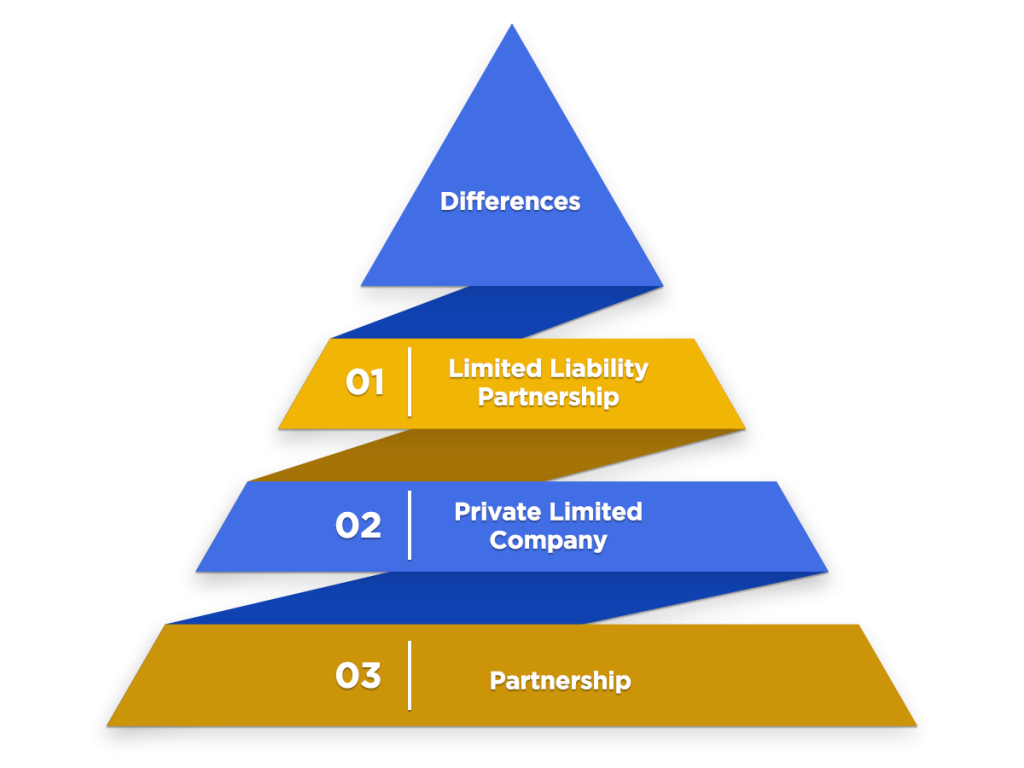How An LLP Firm is Different From Private Company and Partnership Firm?

Shivani Jain | Updated: Sep 02, 2020 | Category: Limited Liability Partnership
The term “LLP Firm” denotes an alternative business format that provides the privileges of both private limited company and a partnership firm. Under this business format, the designated partners enjoy limited liability. That means they are liable only to the extent of the capital contributed by them in the firm.
This article will discuss the concept of LLP Firms and how it is different from a Private Limited Company and Partnership.
Table of Contents
Private Limited Company
A Private Limited Company or Pvt Ltd Co. is a business structure that is privately held by its shareholders. Further, it is a separate legal entity, i.e., the shareholders can enjoy the feature of limited liability. That also means that the liability of a shareholder is limited to the extent of the number of shares held by him/her.
Also, one more significant feature of this business format is perpetual succession. That means the death, bankruptcy, or insolvency of any shareholder or member will not affect the life of the company.
Further, it shall be relevant to note that the requirement of a minimum of Rs 1 lakh paid-up share capital has been removed after the Companies (Amendment) Act 2015.
Lastly, the Vision, Objectives, Mission, and Limitations of a Private Limited Company are specified in the MOA (Memorandum of Association). In contrast, the AOA (Articles of Association) includes all the rules, regulations, and by-laws of the company.
Partnership Firm
In India, a partnership firm as a business format is carried on by 2 or more individuals. This format is based on the principal and agent relationship and is regulated and administered by the provisions of the Indian Partnership Act 1932.
Further, a Partnership Deed is an agreement signed between the partners of the partnership firm. This agreement contains details, such as the nature of the firm, the right and duties of partners and their profit and loss sharing ratios, etc.
However, a partnership firm does not enjoy the status of a separate legal entity. That means all the partners of this business structure cannot enjoy the feature of limited liability.
Difference between LLP, Private Limited Company and Partnership

| S.no | Basis of Difference | Limited Liability Partnership Firm | Private Limited Company | Partnership Firm |
| 1 | Governing Law | A Limited Liability Partnership is governed by the provisions of the Limited Liability Partnership Act 2008. | The Provisions of Companies Act 2013 govern a Private Limited Company. | A Partnership Firm is governed by the provisions of the Indian Partnership Act 1932. |
| 2 | Minimum Capital Requirement | No Minimum Capital Requirement | No Minimum Capital Requirement (removed after the Companies (Amendment) Act 2015 | No Minimum Capital Requirement |
| 3 | Registration Processing Time | Normally, 8 to 10 Business Working Days are required to Complete the Process of Registration. | Normally, 8 to 10 Business Working Days are required to Complete the Process of Registration. | 6 to 8 Business Working Days to Complete the Process of Registration. |
| 4 | Mandatory or Optional Registration | It is mandatory to obtain LLP Registration. | It is mandatory to obtain a Private Limited Company Registration. | It is not compulsory to obtain a partnership Firm Registration. |
| 5 | The requirement to add Suffix | The name of the entity must include “LLP” or “Limited Liability Partnership” as a suffix. | The name of the entity must include “Pvt Limited” or “Private Limited” as a suffix. | No need to add any Suffix. |
| 6 | Mode of Creation | Created by Law | Created by Law | Created by a Contract between 2 or more people. |
| 7 | Separate Legal Existence | It is a Separate Legal Entity under the LLP Act 2008. | It is a Separate Legal Entity under the Companies Act 2013. | It is not a Separate Legal Entity under the Indian Partnership Act 1932. |
| 8 | Formation Cost | The cost of forming an LLP in India is comparatively lesser than a Private Limited Company. | The cost of forming a Private Limited Company in India is very high. | The Formation Cost for a Partnership Firm is negligible. |
| 9 | Perpetual Succession | It has the feature of Perpetual Succession. | It has the feature of Perpetual Succession. | It does not have the feature of Perpetual Succession. |
| 10 | Common Seal | A common seal acts as the signature of an LLP Firm. | A common seal acts as the signature of a Private Limited Company. | There is no concept of a Common Seal. |
| 11 | Charter Document | Limited Liability Partnership or LLP Agreement. | MOA (Memorandum of Association) and AOA (Article of Association) | Partnership Deed |
| 12 | Incorporation Formalities | Several E-forms, together with the requisite fees, are submitted to the Registrar of LLPs. | Several E-forms, copies of MOA and AOA, together with the requisite fees, are submitted to the Registrar of Companies (ROC). | In the case of a Partnership Firm, a copy of the Partnership Deed, together with the required documents and fees are submitted to the ROF (Registrar of Firms)[1] . |
| 13 | Foreign Participation | Foreign Nationals can become a member of an LLP Firms | Foreign Nationals can become members of a Private Limited Company. | Foreign Nationals cannot become partners in a Partnership Firm. |
| 14 | Members | Minimum: 2 Maximum: No Limit prescribed. | Minimum: 2 Maximum: 200 | Minimum: 2 Maximum: 20 |
| 15 | A Limited Liability Partnership is governed by the provisions of the Limited Liability Partnership Act 2008. | A Limited Liability Partnership is independent of its Designated Partners. That means it can have the Ownership of Assets. | A Private Limited Company is independent of its Members. That means it can have the Ownership of Assets. | Partners have a Joint Ownership with the Firm. |
| 16 | Legal Proceedings | LLP Firms can sue a Third Party. | A Private Limited Company can use a Third Party. | A Partnership Firm cannot sue a Third Party if not registered. |
| 17 | Liability Clause | It is limited to the extent of the contribution made by the Designated Partners. | It is Limited to the extent of the contribution made by the Members of a Private Limited Company. | Unlimited Liability, as a partnership firm, does not enjoy the status of Separate Legal Entity. |
| 18 | Tax Liability | Flat Rate of 30% | Flat Rate of 30% | Flat Rate of 30% |
| 19 | Principal-Agent Relationship | Designated Partners act as Agents for LLP Firms. | Directors act as Agents for Private Limited Company. | Partners act as Agents for Partnership Firm. |
| 20 | Transfer of Shares | In the case of the death of a designated partner, the legal heirs have the right to claim a refund of the capital contributed + shares in accumulated profits. However, legal heirs will not become designated partners in an LLP Firms. | In the case of the death of a member, shares are transferred to the legal heirs. | In the case of the death of a partner in a partnership firm, the legal heirs of the deceased have the right to claim the refund on the capital contributed + share in the accumulated profits, if any. However, legal heirs will not become partners. |
| 21 | Transfer of Rights | Possible only if the LLP Agreement provides the clause of Transfer of Rights. | Ownership of Rights is Transferable | Ownership Rights are not transferable. |
| 22 | Director Identification Number (DIN) | Each Designated Partner needs to mandatorily have DIN. | Each Director needs to mandatorily have DIN. | There is no need for the partners to have DIN. |
| 23 | Digital Signature Certificate (DSC) | At least one DP (Designated Partner) must have DSC to sign the forms electronically. | At least one Director must have DSC to sign the forms electronically. | No need of a Digital Signature Certificate. |
| 24 | Dissolution | Voluntary or Compulsory (by order of the NCLT). | Voluntary or Compulsory (by order of the NCLT). | The reasons for dissolving a Partnership Firm are as follows: Agreement; Mutual Consent; Insolvencies; Certain Contingency; Court Order |
| 25 | Admission as Member/ Partner | Any individual can be admitted as a designated partner in an LLP firm as per the provisions of the LLP Agreement. | Any individual can become a member of a private company only by purchasing its shares | Any individual can be admitted as a partner in a firm as per the provisions of the Partnership Agreement. |
| 26 | Cessation as Member or Partner | An individual can cease to be a designated partner as per the provisions of the LLP Agreement. He/she can also give a notice of 30 days for the same. | An individual can cease to be a Member if he/she decides to sell his/her shares. | An individual can cease to be a partner as per the provisions of the Partnership Agreement. |
| 27 | KMP Requirement | Designated Partners are responsible for managing business operations. | Directors are appointed to manage business operations. | There is no need to appoint KMP (Key Managerial Personnel). |
| 28 | Statutory Meetings | There is no provision regarding statutory meetings. | General Meetings and Board Meetings are conducted as per the provisions of the Companies Act 2013. | There is no provision regarding statutory meetings. |
| 29 | Maintenance of Minutes | If provided in the LLP Agreement, the minutes of the meeting will be recorded. | It is mandatory to record the minutes of the meeting of shareholders and directors. | No concept relating to Maintenance of Minutes. |
| 30 | Voting Rights | Depends on the LLP Agreement | Depends on the Number of Shares held by each member. | Depends on the Partnership Agreement |
| 31 | Remuneration to Managerial Personnel | Depends on the LLP Agreement | Depends on the Provisions of Companies Act 2013 | A Partnership Firm may pay remuneration to its partners. |
| 32 | Contracts with Director and Partner | Designated Partners of an LLP Firms are free to enter into any contract. | Restrictions on BOD (Board of Directors) concerning some specified contracts, in which the directors are interested. | Partners of a Partnership Firm are free to enter into any contract. |
| 33 | Statutory records | Needs to Maintain Books of Accounts | Needs to Maintain Books of Accounts, Minutes of Meetings, Statutory Registers. | Needs to Maintain Books of Accounts |
| 34 | Annual Filing of Returns | An LLP Firms needs to mandatorily file its Annual Statement of Accounts, and Solvency and Annual Return with the Registrar of Companies every year. | A Private Limited Company needs to mandatorily file its Annual Financial Statements and Annual Return with the ROC (Registrar of Companies) every year. | No need to file any return with the Registrar of Firms. |
| 35 | Share Certificate | The ownership of the designated partners is witnessed by the LLP Agreement. | Share Certificates acts as the proof of ownership of shares held by each member in the Company | The ownership of the partners is witnessed by the Partnership Deed. |
| 36 | Audit of Company’s Accounts | All the LLP Firms except for those which are having an annual turnover of less than Rs 40 Lacs or Rs 25 Lacs contribution in any financial year need to get their accounts audited annually according to the provisions of LLP Act 2008. | All the Private Limited Companies need to get their accounts audited annually according to the provisions of the Companies Act 2013 | All the Partnership firms are only required to have tax audit of their accounts as per the provisions of the Income Tax Act |
| 37 | Applicability of Accounting Standards | The rules concerning the application of accounting standards are not issued yet. | All Private Companies need to comply with the Accounting Standards. | Accounting Standards are not applicable. |
| 38 | Compromise/ Arrangements/ Merger/ Amalgamation | An LLP Firms can enter into Compromise/ Arrangements/ Merger/ and Amalgamation. | A Private Company is eligible to enter into Compromise/ Arrangements/ Merger/ and Amalgamation. | A Partnership Firm cannot enter into a Compromise/ Arrangements/ Merger/ and Amalgamation. |
| 39 | Oppression and Mismanagement | No provision concerning the redressal in the case of oppression and mismanagement. | Provisions concerning the redressal in the case of oppression and mismanagement exist. | No provision concerning the redressal in the case of oppression and mismanagement. |
| 40 | Credit Worthiness of the Organisation | An LLP Firms enjoys comparatively higher creditworthiness than a Partnership Firm. | Due to Stringent Provisions and Disclosures under several laws, a Private Limited Company enjoys a high degree of creditworthiness. | In a Partnership Firms, creditworthiness depends on the Goodwill of the partners. |
Conclusion
Thus, in the last we can say that an LLP Firms or a Limited Liability Partnership enjoys an upper hand over the traditional Private Limited Company and Partnership Firm. It means that this business format provides flexibility in the areas where both private company and partnership lacks.














